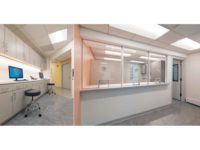As some of us make the shift from working from home to heading back to an office space, it leads me to wonder what the offices of the future will look like. There’s no doubt that the COVID-19 pandemic has altered our entire way of life. It’s definitely altered how we’ll design public places too.
Workplaces are sure to become more functional, more comfortable, promote a better mental wellbeing and possibly become "pandemic proof."
Using Natural Lighting
Among the many benefits of being exposed to natural lighting during normal waking hours, the biggest one of them is Vitamin D for our immune system and emotional health. This was made clear over the last two years as doctors told us time and time again to go outside to get fresh air and sunlight.
So how do we design offices that can achieve this? If you can't design an entire window and curtainwall system, or if you can but your office building faces the opposite direction of the sun's rays, there are lighting solutions that incorporate biophilic design principles.
Along with boosting our immunity, natural lighting or biophilic lighting solutions also keep our stress levels down and our productivity at a maximum.
Noise Control
If an office is designed and organized so that office activities based on noise-level could be grouped together, productivity would probably increase. For example, spaces closer to the main entrance would be better for meetings, the kitchen area or other louder activities.
As you go deeper into the office, noise levels should become quieter where employees are more able to get their work done. Those employees coming from a home office will need to transition from the solidarity at home to an office environment with many distractions.
A Residential-Feel
I think it’s important to note that offices will start to incorporate a more “homey” feel from now on. This probably includes more plants, more casual décor and more “work nooks” instead of typical desks or cubicles.
Workers will no longer be going to an office with old wallpaper and dark lighting. Not when they can work from the comfort of their own homes. Those days are behind us.
The following years will probably bring more adjustable workplaces—these can include movable dividers that easily re-arrange a room—anything that will make it easy for employees to curate their own spaces.
These are just some ideas of what I expect to see when it comes to offices of the future. I’d love to hear yours! How do you think architects will design office spaces for 2023 and beyond? Email them to me at lewisl@bnpmedia.com







